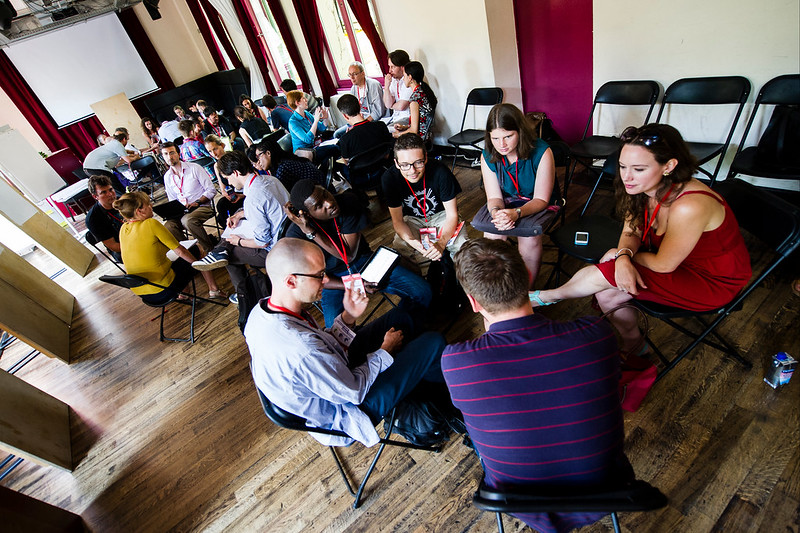As some might remember, last year we ran a very popular blog post series called Global Community Stories, which highlighted activities in the ever-broadening Local Groups global community. Towards the latter half of the year lots of other projects demanded time and the series came to an unintended halt. With the turn of the year, however, we want to change that and that we why we’re now rebooting the series and plan to make this a monthly activity.
Enough talk, let’s start our journey – here are some of the things that happened in January!
FRANCE
In France lots of activities are in motion right now, but one particularly worth noting is the participation in the first Public Domain Festival.
It ran from 16th to 31st January in Paris and featured concerts, screenings, workshops, conferences in museums, libraries, hackerspaces and schools. It included over 28 different events which aimed to inform citizens and enable them to create together – as well as to highlight the public domain from all angles and for all ages.
GERMANY
Among other news, the Open Knowledge Chapter in Germany has been awarded a new EU Horizon 2020 research project, titled The Digital Whistleblower: Fiscal Transparency, Risk Assessment and Impact of Good Governance Policies Assessed (DIGIWHIST), to improve transparency in public spending and support whistleblowing. The central objective of DIGIWHIST is to improve trust in governments and efficiency of public spending across Europe by empowering civil society, investigative journalists and civil servants with the information and tools they need to increase transparency in public spending and thus accountability of public officials in all EU and in some neighbouring countries. Read more about the project here.
SPAIN
The Spanish chapter of the Open Knowledge once again organizes a global award for the best initiatives in open knowledge, open data and transparency. The six categories will award those projects and initiatives that have made visible or give practical for the public, industry and economics of open data, open knowledge and transparency.
The awards consist of six categories, including the best initiative to encourage entrepreneurship based on open knowledge, the best business based on open knowledge, the best non-public transparency initiative, the best open science initiative, the best public initiative to support Transparency through the Open Data, and the best public open data initiative with involvement of citizens/society.
The awards ceremony will take place on February 21 at Media Lab Prado, coinciding with the celebration of the worldwide Open Data Day. The ceremony will feature an address by the president of Open Knowledge, Rufus Pollock, as well as the announcement of the winner of a special initiative: The Anti-Award ‘Padlock’ to the most opaque and closed initiative, whether public or private, elected by registered users via the Award prize page.
This second edition of the award features an English page to help institutions and initiatives internationally take part. Today is the deadline for applications, so jump on in and make a submission if you have candidates!
SWITZERLAND
Coinciding with Champions League, Milan joined Swiss groups in Basel and Sierre to kick off the new Sports Working Group with a first hackathon, sparking discussion of transparency on an international level at the yearly conference in Zürich, where the community engaged in diverse talks and
launched new projects. A big theme of 2014 was renewed commitments to Swiss openness: a parliamentary <ahref=”http://www.parlament.ch/d/sessionen/sda-sessionen/Seiten/20141208_bsd191_Beschaffungswesen.aspx”>motion for Procurement Data, legal provisions to opening <ahref=”http://opendata.ch/2014/09/vernehmlassung-metg/”>weather data, developments in the City of Zürich and Canton of St.Gallen – and the Open
Government Data Strategy confirmed by the Federal Council in April and embedded in the action plan.
While Open Budget visualisations are now deployed for the canton of Berne and six municipalities, spending data remains a challenge. Student teams
participating in a new university course are helping to advance the cause for financial transparency.
New open data projects were released, such as WindUndWetter.ch and SwissMetNet API, based on just-opened national weather data. But, talk about “hold your horses”: a closed-source city waste removal schedule app led to intense debate with officials over open data policy, the results making waves in the press and open data developers leading by doing.
The new year promises at least as much: the next hackathon organised by the new OpenGLAM.ch Working Group, together with Wikimedia and the National Library, is canvassing Swiss institutions to provide content, data, and expertise – and inviting global participation. For the full calendar of upcoming events, visit their blog.









